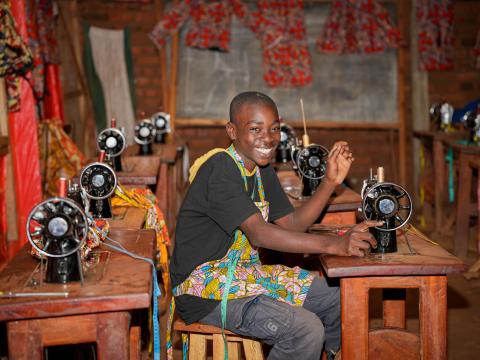RIBOUND: When Music Restores Hope to Young People in Lubero Thanks to Wolfgang’s Support

By Rodrigue Harakandi, Communications Coordinator
Imagine teenagers scared by war, poverty, or displacement, suddenly reclaiming their right to dream. That’s the powerful impact of the RIBOUND project, a humanitarian initiative led by World Vision with the backing of renowned German musician Wolfgang Niedecken, in Lubero territory, North Kivu. For the past three years, the programme has been transforming lives, restoring not only skills but also dignity to vulnerable youth.
Implemented with local partner Cœur Sans Frontières, RIBOUND offers an integrated approach: vocational training, psychosocial support, and assistance with economic reintegration. In July 2025, a third cohort of 57 young people completed the programme, bringing the total number of trained beneficiaries to 173 since its launch in 2023.
Comprehensive Training for a New Start
The project targets vulnerable youth, many of whom are survivors of armed violence, offering them:
Vocational training in trades such as tailoring, carpentry, car mechanics, or beauty care
Psychosocial support to help heal invisible wounds
Start-up kits (sewing machines, tools, etc.) to launch income-generating activities
Holistic care throughout the training: daily meals, clothing, and medical follow-up
Participants also benefit from modules in entrepreneurship and financial management, key to ensuring their long-term self-reliance.
Stories that Inspire
Testimonies from former participants illustrate just how transformative the project has been. Take Alice, 19, who rebuilt her life after a painful family loss.
“RIBOUND welcomed me at a time when I was struggling after my father’s death. Thanks to the tailoring training and the machine I received, I’m now able to support my family and earn a living by making clothes. This work has even allowed me to invest in a small poultry farm and a cassava field,” says Alice, 19, seamstress and entrepreneur.
Like her, Fabien’s life took a new turn thanks to the skills he acquired at the centre. Orphaned by war, he rebuilt his identity through manual labour.
“My parents died in the conflict. I was raised by my grandmother and often went hungry. Today, carpentry gives me both an income and a future. I make furniture, build houses, and I’m saving up to buy my tools,” says Fabien, 18, a carpenter.
The Silent Pillars of Change
Behind these committed young people are the often-unseen individuals who keep the centre running. Jeanine, for instance, runs the daycare and plays a vital role for young mothers.
“Some girls arrive pregnant after being raped. Others come with undernourished babies. My role? To allow them to learn while I look after their children. What makes me happy? The babies’ smiles and the affection they show me,” says Jeanine, 39, daycare manager.
A Model Worth Expanding
Among staff, there is strong hope that the project will grow, as the needs on the ground remain immense. The project manager calls for greater support.
“As conflict continues in the region, the risk of young people being recruited into armed groups remains high. Wemust scale up initiatives like this one. RIBOUND proves that an integrated approach, skills training, healing, and economic autonomy offer a real alternative in crisis zones. This model should be documented and replicated,”urges Amerhit Mukengere, RIBOUND Project Manager.
The RIBOUND project is much more than a humanitarian response; it is a springboard towards lasting peace, powered by young people who, until recently, had lost all hope. Thanks to an unlikely alliance between a committed artist and dedicated field actors, hope is being reborn in the hills of Lubero.